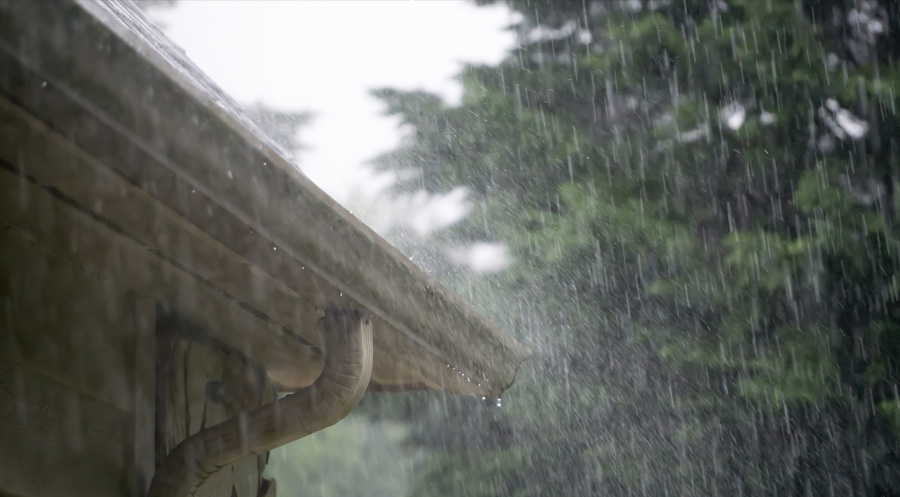Rainfall amounts totaling one inch and higher were common throughout Buncombe County last year. Even though we have experienced drought in the past, excess rainfall can create major issues for your home and yard.
As we enter the rainiest months of the year this spring, it is imperative to understand the possibility of the multitude of serious issues that excess rainfall can create. Anything from broken pipes, flooded yards, clogged storm drains, and flooded basements are some of the more costly symptoms of excess rainfall.
We have compiled this list of a few quick things homeowners need to know about drainage and some of the serious issues that can happen when you disregard issues that excess rainfall can create.
What to Check During Times of Heavy Rainfall
1. Check and Clean Your Gutters
While it was raining, did you notice water spilling out of the sides of your gutters? This likely means your gutters are clogged or malfunctioning.
Gutters are key for channeling water away from your roof and into key drainage areas in your yard. If they are not working properly, water can damage your roof and drain unevenly, affecting your walls and foundation. Once the rain stops, perform these quick tasks:
- Remove leaves and debris from your gutters
- Check your gutters for rust and damage
- Check drainage spouts to make sure they are clear
- Check drainage routes to make sure water is channeled away from your basement and foundation.
2. Check Your Windows and Window Sills for Moisture
Prolonged humidity and fog can help you determine whether your windows require replacement. If you noticed moisture forming inside window panes or on your window sills, it is likely indicative of failing weather sealant.
By replacing your windows, you can ensure that water can not reach the inside of your house from a seemingly insignificant point of contention. However, when it is pouring rain, it will find its way inside via the path of least resistance, and when this is your window, it can lead to disastrous effects.
3. Check Your Yard for Excess Water
Prolonged heavy rainfall can help you identify trouble spots in your yard. Over time, areas of your property can collect water. This can create several issues, including:
- Invasive Water: Water can begin to corrode the foundations of your outdoor buildings.
- Wood Rot: Excess water can lead to wood rot in your fencing materials.
- Mosquitoes: Mosquitoes need excess water to breed.
After all of this rain, take a few moments to make sure rainwater is draining properly from your yard. When water pools up in your yard, it can create issues around your underground pipes that can cause them to clog or, in some cases, fail.
4. Check Your Basement or Crawl Space for Excess Moisture
If water is not draining properly in your yard, water may invade your foundation walls leading to cracks, corrosion, and excess humidity.
This heavy rainfall presents homeowners with an opportunity to examine their basements and crawl spaces. If there are issues with drainage on your property, they may likely present this week. Signs of mold development include:
- Sour odor, like an old, damp towel
- The presence of moisture
- Water damage
- The appearance of fuzzy cultures
5. Using Sump Pumps to Alleviate Moisture in Basements and Crawl Spaces
Sump pumps are super important, as they can provide protection from flooding in your basement. Their job is to essentially pump out any water that enters the area where its holding tank is. Oftentimes, drains that are built in the basement cannot handle the amount of water that excessive rainfall can deposit.
By plumbing in a sump pump into an exterior drain, you can help avoid issues such as basement flooding. A battery-powered sump pump can operate even during brief power outages, which may accompany a severe rain event.
How Heavy Rain Can Affect Your Plumbing
In addition to the four checks above, it is important to understand the reality that excess water can cause issues in your plumbing. Heavy rain can put additional pressure on your pipes.
This happens when the ground surrounding your pipes absorbs water. When the ground absorbs water, it settles, putting pressure on the pipe, which can lead to a burst pipe.
1. Underground Pipe Issues
Underground pipes are also known to move and shift under heavy rainstorms. This is due to the reality that soil can shift and offer less support.
The loose ground can introduce rocks that may cause damage. Some of this damage to underground pipes can let in debris that can cause backups in your plumbing system.
2. Storm Drains
Storm drains can often clog up during heavy storms. When water is moving, it will take just about everything with it, including debris such as leaves and other trash. In the case that a storm drain does clog, it can create drainage issues that may lead to flooding. While it isn't always preventable, cleaning and maintaining your storm drains can save you from a host of issues.
Know When to Call a Professional Plumber
Leaking pipes and old water damage from malfunctioning appliances can also lead to moisture issues. If you have plumbing or drainage concerns in and around your home, we are here to help. We are experienced plumbers in the Asheville area, familiar with the unique plumbing installation and repair challenges in western North Carolina.
Barlow Plumbing is the reliable option for your plumbing job in Buncombe County, NC, if you need a professional plumbing company with the appropriate licenses, insurance, and expertise. We have decades of experience installing bathroom plumbing, addressing repairs, and upgrading homes.
Contact the Barlow Plumbing team now to learn more about how we can help you!
